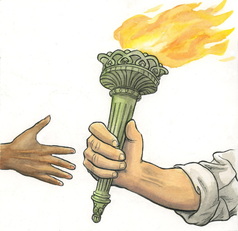When I give talks on prayer I ask the audience to call out the things that fill their day. Depending upon whether the audience consists of adults or students, answers may include work, study, meals, sleep, homework, sports, piano practice, and so on. As they call out each item, I throw a piece of dry sponge into a glass. When the glass is full, I observe, “There’s hardly room for anything else. So when can we pray?” Then I pour water into the glass. Yes, there’s room for prayer. And the water makes the sponge soft and pliable. The “water” of prayer can easily surround the busyness of our day. George Herbert said it well in his poem “Prayer (II)”: “Of what an easy quick access,/My blessed Lord, art thou! How suddenly/ May our requests thine ear invade!”
Elizabeth Barrett Browning in her poem “Substitution” pens that there are times when nothing meaningful can fill the silence. It is then that she begs in her last line: “Speak THOU, availing Christ!—and fill this pause.” We’ve all had times of boredom, emptiness, a feeling of meaninglessness or hopelessness. We might look for something to excite us or fill us or at least give us something to look forward to. Some thing might be a bit helpful momentarily. What our hearts really need and want is God to caulk our holes. So call out “Speak THOU, availing Christ—and fill this pause.”
Lectio divina refers to meditative reading on the Scriptures. Sarah Arthur speaks of lectio sacra or holy reading. Good literature, not only the Bible, presents itself as a source of communion with the Divine. Arthur describes it thus: “Here at the still point, in the nook at the top of the stairs, the Holy Spirit hovers, waiting, waiting for the sound of the turning page.” I am very grateful to the editors and writers of spiritual, liturgical, and ecclesiological publications. I read America cover to cover. Worship magazine presents challenging information, but the magazine is taken in small bites. Articles like ”Thyranoixia and Hajmah: A Study of Polyvalence in Antiochian-Usage Byzantine Liturgical Ritual” can wait another month or three. Many of us religious sisters read The Occasional Papers published by the Leadership Conference of Women Religious. I relax each evening before bedtime with a novel. Fiction can also be lectio sacra. The novel’s characters give insight into humanity. And, after all, isn’t that what Christianity is all about—Jesus Christ coming among us to teach us how to be human?
In her compilation of poems and essays titled At the Still Point, Sarah Arthur writes “Warning: Powerful Spiritual Moment Ahead.” It is the cautionary notice she would like to give her readers before they engage in meditating on the readings. However, she refrains, because “What is a spiritual encounter for one person may not be for another.” Craft this warning into a book mark for your Bible. Post the warning on church doors. Make it a plaque and hang it beneath a clock, for any moment of the day is potential for grace. God comes every moment into our lives—ready or not. You have been warned.
When I visit a church, I go through the front door. But God can easily be met through the back door. Just knock and yell, “I know You’re home.” God has millions of back doors: lakes, trees, mountains, turtles and turkeys, pears and plums, sand and stone, eclipses and hurricanes, beaches and boulders, sofas and rocking chairs, gyms and soccer fields. God’s back door can be found underground and in the sky, in the east and in the west, up or down, country or town.
Jesus said, “Knock, and it shall be opened.” Front door and back. Prayer is just the neighborly thing to do.
Sun no longer wakes me,
Just faint light of a new day.
Electric light needed, but still
Housecoat of summer
Cotton suffices.
First snirkle of brewing coffee,
Brain directed on day’s agenda,
While warm cascade flows over lathered head.
Hot washcloth springs soul to remember
“Good morning, God!”
Toothbrush, too, pushes aside slumber.
Mug in hand,
Blanket caressing shoulders,
I open the day’s Scriptures.
“Cheers!” God and I signal each other–
Our daily brew extended
Mine upward; His downward.
My soul ready to commune
Like late summer pecking early autumn on the cheek.
Recently three of us Sisters of Notre Dame drove to Bellevue, Ohio, to spend time at the Sorrowful Mother Shrine. We attended the liturgy outdoors at 11:00. Then in the afternoon we walked the pathways lined with the Stations of the Cross and many statues of saints. I was impressed by the variety of saints from different centuries, countries, and walks of life. Among the more recent saints were martyrs from the Ukraine, Mother Teresa of Calcutta, and Maximilian Kolbe. A barn-like structure housed the statues of Saint Isadore and his wife Maria, patron saints of farmers. Two scythes and baskets of produce reminded us visitors of the daily-ness and ordinariness of holiness attested by Isadore and Maria. The two largest shrines included the sepulcher of Jesus and the statues of Our Lady of Fatima and the children who propagated devotion to Mary 150 years ago. All pathways led back to the chapel, where prayer to Mary and the saints leads to adoration of our Eucharistic Lord.
If you have never visited the Sorrowful Mother Shrine in Bellevue, you will not go wrong if you add it to your bucket list. Thousands of pilgrims have prayed there, giving its many acres of hermitages and woods an accumulation of blessings. Don’t leave the shrine without filling bottles with holy water and yourself with abundant blessing.
I recently attended the National Pastoral Musicians Convention in Cincinnati, an event in its 40th year. To commemorate the anniversary a large bronze bell was cast. It sat prominently in the Grand Ballroom and called the attendees to prayer and plenum sessions. Unfortunately the convention has dropped attendance in the past few years, and the event seemed to lack some of the spirit I witnessed 20 years ago. The NPM officers realize this and are working to increase attendance and revitalize the convention. Many of the speakers were seasoned composers, musicians, or liturgists, and I sensed an urgency to pass the torch to those who would become the next David Haas or Marty Haugen. These two composers themselves have become mentors, so the caliber of their style will continue giving the Church worthy ritual music.
In a similar way our culture has lost much of its focus on America’s great ideals of equality, freedom, ethics, hard work, integrity. Before it’s too late we need persons of stature to mentor our next leaders. Who will become the leader with the charism of Martin Luther King, the President with the compassion of Abraham Lincoln, the adventurer with the spirit of John Glenn? Who will continue the poetic genius of Maya Angelou, the research of our Nobel Prize winners, the spiritual insight of Mother Teresa? Could a brass bell wake us from our dying culture? Can we pass the torch before it’s extinguished?
Reflect a moment on how you are impacting the future. To whom are you passing your wisdom and skills?
When Jesus ascended into heaven, he left his Church in a fragile state. Although all power in heaven and earth had been given to Jesus Christ, who in turn handed that power to his first disciples, the situation was far from what a CEO would want for a corporation. Fortunately Jesus’ mother Mary knew the heart and mind of her Son and could guide the fledgling Church. Within ten days the Spirit of Jesus descended upon Mary and the apostles, and the Church was off and running! How many months or years elapsed before Mary was taken into heaven, no one knows. As the angels and saints in heaven rejoiced to receive their Queen, the young Church must have felt a great loss, yet found a maternal intercessor who would never abandon her children, her Church.
Mary, assumed into heaven, pray for us, your children, your Church. Share with us the mind and heart of your Son as we continue the mission of Jesus. And one day receive us into the heavenly Kingdom where you reign as Queen and Mother.
I’m starting a work week, and I hope there will be something special about the week. “Special” could happen unexpectedly, but often enough it means I have to create “special.” One way is to change my vision. An experiment I participated in recently proves this point. The audience was asked to introduce themselves to someone nearby. We spoke in rather quiet tones about our names, jobs, residence. Next we were asked to pretend this same person was a very good friend not seen for ten years. The volume dramatically increased, handshakes became hugs, smiles and laughter abounded. The difference? Our vision. We first viewed the person as an acquaintance and then as a friend. I can take this same change in vision into my work week. I can envision the day as ho-hum and boring, or I can anticipate surprise and newness. I can plan to make it special with little shocks of happiness: a treat for coworkers, a note of gratitude, an act of kindness, a display of concern. Set your sights on beauty and goodness. Create a day that doesn’t disappoint.









